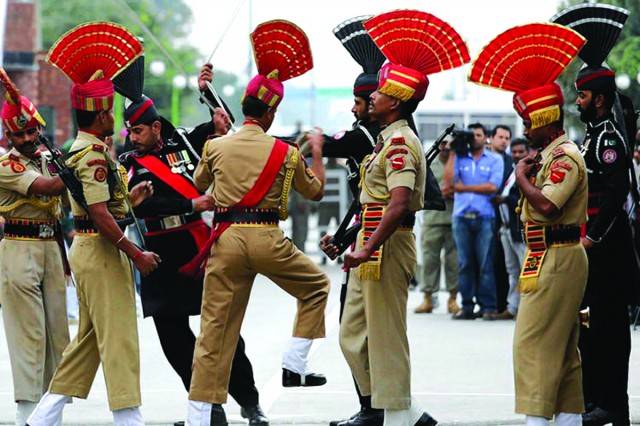
On a rainy September Sunday afternoon, typical of Mumbai’s monsoons, a Punjabi friend with roots in Lahore and I were at an auditorium to watch a play on the life of Mahatma Gandhi. Just before the play started, there was an announcement asking everyone to stand up for the national anthem. This was standard operating procedure for a cinema hall or a cricket match, but plays and concerts had robbed us of an opportunity to not display our love of the motherland! My friend noticed the frown on my face on hearing the announcement, and then sang along to the tune of ‘Jana Gana Mana.’ As we sat down, she said she was a proud patriot. Two hours later, after we eat a nice lunch and were walking towards a taxi, she threw a tissue on the ground. I asked her why she was littering and she replied in a defiant and aggressive manner that she threw the tissue on a rubbish heap! Samuel Johnson did have it right when he said that patriotism was the “last refuge of the scoundrel.”
A public display of nationalistic and patriotic pride is seen as a virtue in India and Pakistan. Those of us who take objection to flag waving jingoism get called all sorts of names by the guardians of patriotism. Violence and discrimination against minorities, indulging in corrupt practices, destroying the environment and littering do not count as unpatriotic activities. Just wave a flag and shout “Bharat Mata Ki Jai” or “Pakistan Zindabad,” depending on which side of the fence you are in, and you can get a patriotism certificate.
Indian and Pakistani patriotism come head-to-head at the Wagah-Attari border, where personnel of the highly professional armed forces of these two countries indulge in “colourful” maneuvers and leg raises with a high degree of aggression. The daily display of patriotic theatrics was a victim of Covid-19 and has been suspended. What purpose does this daily display of bravado achieve? In a region, where rational thought among the masses is highly discouraged by the thriving elite, the event at the border is some sort of a ‘high energy, feel good’ session for people who are temporarily distracted from their problems in life.
Why not just do away with the show and have a simple and sober retreat ceremony without the aggression? One of the best ways for the authorities to show that they mean it when they make peace overtures would be to stop this almost comical display of belligerence and bravado that just prolongs the “othering.”
Local economy
People who have watched the ceremony from both sides (read privileged Westerners with easy access to both countries) claim the crowds are much larger in Attari than in Wagah. On the Indian side, more than 10,000 tourists turn up on a weekday for the event and this can swell to 30,000 on occasions like Independence Day.
On the Indian side, as must be the case across the border, an economy has been set up from serving the tourists who visit to watch the ceremony. Tea stalls, juice vendors, tattoo makers, face painters, dhabas and shops selling flags and souvenirs provide employment to a large number of people. Local reports suggest that these groups have taken a severe financial hit with the suspension of the ceremony. Restrictions on trade have affected the daily laborers who work as porters in the area.
However, the argument that the hyper-nationalistic ceremony is absolutely necessary to generate a large amount of money for the local economy does not hold water. Many people in both countries have a craving to see the other side, and as long as the global arms industry ensures the South Asian neighbors remain hostile to each other, it is next to impossible to hop across the borders with freedom like in Europe. Tourists would still visit Wagah and Attari to just get a small glimpse of the other country.

An alternative tourist attraction
If Pakistan and India are serious about peace, then they should build an integrated museum and memorial complex on the border dedicated to the victims of partition. Let such a museum allow access to people from both countries, the way some areas in the Demilitarized Zone on the Korean peninsula allows visits. Given the security infrastructure that both Pakistan and India have, safeguards can be put in place to hamper the smuggling of people, arms and narcotics.
Such a museum, in addition to educating a younger generation of Pakistanis and Indians about the horrors of the violence during the partition, would also go a long way in establishing people to people contacts. Indians, who have crossed the border to visit the Kartarpur Gurudwara, speak of how welcome they felt in Pakistan. An international museum operated by both countries would generate immense goodwill, in addition to ordinary people getting a tiny bit of access to the other side.
Making Wagah-Attari a zone of peace is in the best interests of both countries. An aggressive and over-dramatized show of jingoism performed by the armed forces personnel only adds to the current atmosphere of toxicity, something the real enemies of the people of Pakistan and India use to their advantage.
The writer is a journalist based in India
A public display of nationalistic and patriotic pride is seen as a virtue in India and Pakistan. Those of us who take objection to flag waving jingoism get called all sorts of names by the guardians of patriotism. Violence and discrimination against minorities, indulging in corrupt practices, destroying the environment and littering do not count as unpatriotic activities. Just wave a flag and shout “Bharat Mata Ki Jai” or “Pakistan Zindabad,” depending on which side of the fence you are in, and you can get a patriotism certificate.
Indian and Pakistani patriotism come head-to-head at the Wagah-Attari border, where personnel of the highly professional armed forces of these two countries indulge in “colourful” maneuvers and leg raises with a high degree of aggression. The daily display of patriotic theatrics was a victim of Covid-19 and has been suspended. What purpose does this daily display of bravado achieve? In a region, where rational thought among the masses is highly discouraged by the thriving elite, the event at the border is some sort of a ‘high energy, feel good’ session for people who are temporarily distracted from their problems in life.
Why not just do away with the show and have a simple and sober retreat ceremony without the aggression? One of the best ways for the authorities to show that they mean it when they make peace overtures would be to stop this almost comical display of belligerence and bravado that just prolongs the “othering.”
If Pakistan and India are serious about peace, then they should build an integrated museum and memorial complex on the border dedicated to the victims of partition
Local economy
People who have watched the ceremony from both sides (read privileged Westerners with easy access to both countries) claim the crowds are much larger in Attari than in Wagah. On the Indian side, more than 10,000 tourists turn up on a weekday for the event and this can swell to 30,000 on occasions like Independence Day.
On the Indian side, as must be the case across the border, an economy has been set up from serving the tourists who visit to watch the ceremony. Tea stalls, juice vendors, tattoo makers, face painters, dhabas and shops selling flags and souvenirs provide employment to a large number of people. Local reports suggest that these groups have taken a severe financial hit with the suspension of the ceremony. Restrictions on trade have affected the daily laborers who work as porters in the area.
However, the argument that the hyper-nationalistic ceremony is absolutely necessary to generate a large amount of money for the local economy does not hold water. Many people in both countries have a craving to see the other side, and as long as the global arms industry ensures the South Asian neighbors remain hostile to each other, it is next to impossible to hop across the borders with freedom like in Europe. Tourists would still visit Wagah and Attari to just get a small glimpse of the other country.

An alternative tourist attraction
If Pakistan and India are serious about peace, then they should build an integrated museum and memorial complex on the border dedicated to the victims of partition. Let such a museum allow access to people from both countries, the way some areas in the Demilitarized Zone on the Korean peninsula allows visits. Given the security infrastructure that both Pakistan and India have, safeguards can be put in place to hamper the smuggling of people, arms and narcotics.
Such a museum, in addition to educating a younger generation of Pakistanis and Indians about the horrors of the violence during the partition, would also go a long way in establishing people to people contacts. Indians, who have crossed the border to visit the Kartarpur Gurudwara, speak of how welcome they felt in Pakistan. An international museum operated by both countries would generate immense goodwill, in addition to ordinary people getting a tiny bit of access to the other side.
Making Wagah-Attari a zone of peace is in the best interests of both countries. An aggressive and over-dramatized show of jingoism performed by the armed forces personnel only adds to the current atmosphere of toxicity, something the real enemies of the people of Pakistan and India use to their advantage.
The writer is a journalist based in India

